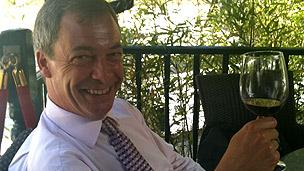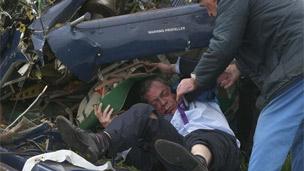What now for UKIP's Nigel Farage?
- Published

Nigel Farage: Wants to get balance right after crash
"I must be the luckiest man alive. To come out of that horror story, firstly alive, and secondly not stuck in a wheelchair or something like that, I mean, goodness me, how lucky can you be."
For a man who was staring death in the face a few weeks ago, trapped in the twisted wreckage of a light aircraft with aviation fuel leaking all around him, Nigel Farage is on remarkably good form.
The former leader of the UK Independence Party has bounced back from cancer and a major road accident in the past, he explains, and is beginning to feel as if he might be leading a charmed life.
"Someone, somewhere is looking after me. Goodness only knows why."
He is not yet fully recovered from the accident. After our lunch, at one of his favourite West London restaurants, he is off for more X-rays on the cracked ribs he suffered when the aircraft he was in plummeted to the ground on polling day.
But apart from a few cuts and bruises, he seems back to his normal, ebullient self.
Crossroads
If his many opponents in Brussels hoped he might emerge from the wreckage a changed man - a cappucino-sipping Boulevardier with a copy of the Lisbon Treaty tucked under his arm - they will be disappointed.
He remains as committed to the Eurosceptic cause as ever. But he does claim that his potentially fatal publicity stunt (the plane he was in got tangled up in a Vote UKIP banner it was towing) has made him look again at his priorities in life.
"I think I am a little bit calmer than I was," he says. "I have also promised myself that I am going to take a bit more time for myself and for my family.
"In the last 10 years I have been pretty workaholic with the UKIP thing. That doesn't mean I don't believe in it any more, it just means maybe, I have thought I have not had the balance right at times."
Even without the crash, it is easy to see how Mr Farage might feel he is at something of a crossroads in life.
UKIP defied the odds again at last year's European elections, beating Labour into third place, much to the dismay of those, on the left and right, who had written the party off as a busted flush.
But Mr Farage's decision to step down as leader for a tilt at the bigger prize of a seat at Westminster backfired when he failed to unseat Commons Speaker John Bercow in Buckingham, leaving him in a curious state of limbo.
'Nightmare'
He remains the public face of UKIP - still in demand from political discussion programmes and probably the only member of the party most members of the public would recognise - but he is no longer its leader. That honour belongs to his friend, the former Tory peer Lord Pearson.
Buckingham was probably UKIP's best shot of gaining a seat in the Commons on its own merits, I suggest, without relying on defections from other parties.

He was pulled from the wreckage of a light aircraft on polling day
"For the moment, that's true," he says, "the first-past-the-post system is a nightmare for us."
What about the Alternative Vote, which is set to be the subject of a referendum next year?
"It's a waste of time. It hardly changes anything. It's not a proportional system, it's a preferential system. It will make very little difference. And I am amazed that Clegg has sold out, frankly."
As he puffs on his pipe on the restaurant's sun-drenched smoking terrace, he contemplates the irony of being the only British leader of a political group in the European Parliament, an institution he is dedicated to dismantling along with the rest of the EU bureaucracy.
He claims to be one of the best known British politicians in Europe and insists he is even gaining fans in federalist Germany over his stance on the Greek debt crisis, which he sees as the beginning of the end for the single European currency.
"My support base in Germany has gone through the roof. Every time I speak about the euro the German blogs go berserk. Bild are quoting me every week."
Juvenile behaviour
At this point, in a moment that could almost be a set-up, but seems genuine enough, Farage is approached by a fan.
Barry, who works in Germany and like the former UKIP leader is married to a German woman, shakes the UKIP man by the hand and tells him to keep up the good work.
Mr Farage, naturally enough, is flattered, although he adds: "Trouble is, late at night on the train on the way home, you get the opposite."
He also confesses to regretting the tone of his personal attack last year on EU president Herman Van Rompuy - who he said had the "charisma of a damp rag and the appearance of a low-grade bank clerk".
Some commentators saw this is a national embarrassment for the UK - an outbreak of boorish, juvenile behaviour that confirmed UKIP as died-in-the-wool xenophobes.
Mr Farage says: "I don't regret the words but I think the delivery - and it was a bit like a bear pit in there and I was screamed at by all sides - and I allowed myself to raise my voice unnecessarily.
"So I think it came across, it came across as being a little bit aggressive. I could have said those words in a different way and it wouldn't have had quite that impact.
"However, what I was really vilified for wasn't that, it was to say that Belgium is pretty much a non-country.
"Janet Street-Porter accusing me of racism. I did ask her whether it was the Flems or the Walloons I was being racist about but I am not sure she knew what I was talking about."
'Making mischief'
He describes the election of a Dutch-speaking separatist party in Belgium's general election, which favours the gradual break up of the country, as "delicious", seeing it another sign that Europe is heading towards break up as a political entity.
"The idea that the Belgians loathe me is nonsensical. Yes, of course I have been shouted at in Brussels bars, but mostly by EU people, not Belgian people," he says, adding "in Flanders people think I'm terrific".
Mr Farage still gets a kick out of "making mischief", as he calls it - but how much longer will he continue to do so as a full time politician? He has, after all been an MEP for more than a decade now.
He has talked in the past about forging a career in the media and if the rules on political balance in broadcasting were ever relaxed, he could see himself becoming a right wing radio "shock jock".
He claims to be genuinely unsure about what the future holds for him.
"I am as committed to this great battle, as I see it, as I ever was but exactly where I'm going to be in two or three years, what I'm going to be doing, I don't know.
"In the past, I've always had goals, I've always looked ahead to targets a year, two, three, four years hence, but my mind is not full of things like that... I am having a reflective pause about exactly where I'm going to be."
This is all starting to sound a bit valedictory.
But just as I am beginning to compose "Farage to quit politics" headlines in my head he snaps out of it.
"Don't worry, I will be back to making mischief in September," he says with a trademark wheezy laugh.
And with that he heads off to hospital for those X-rays.